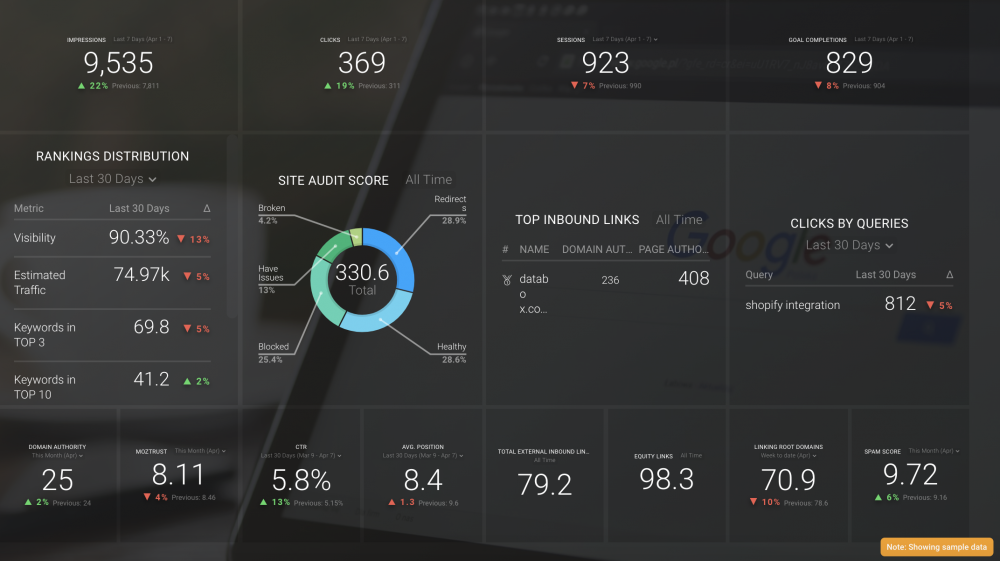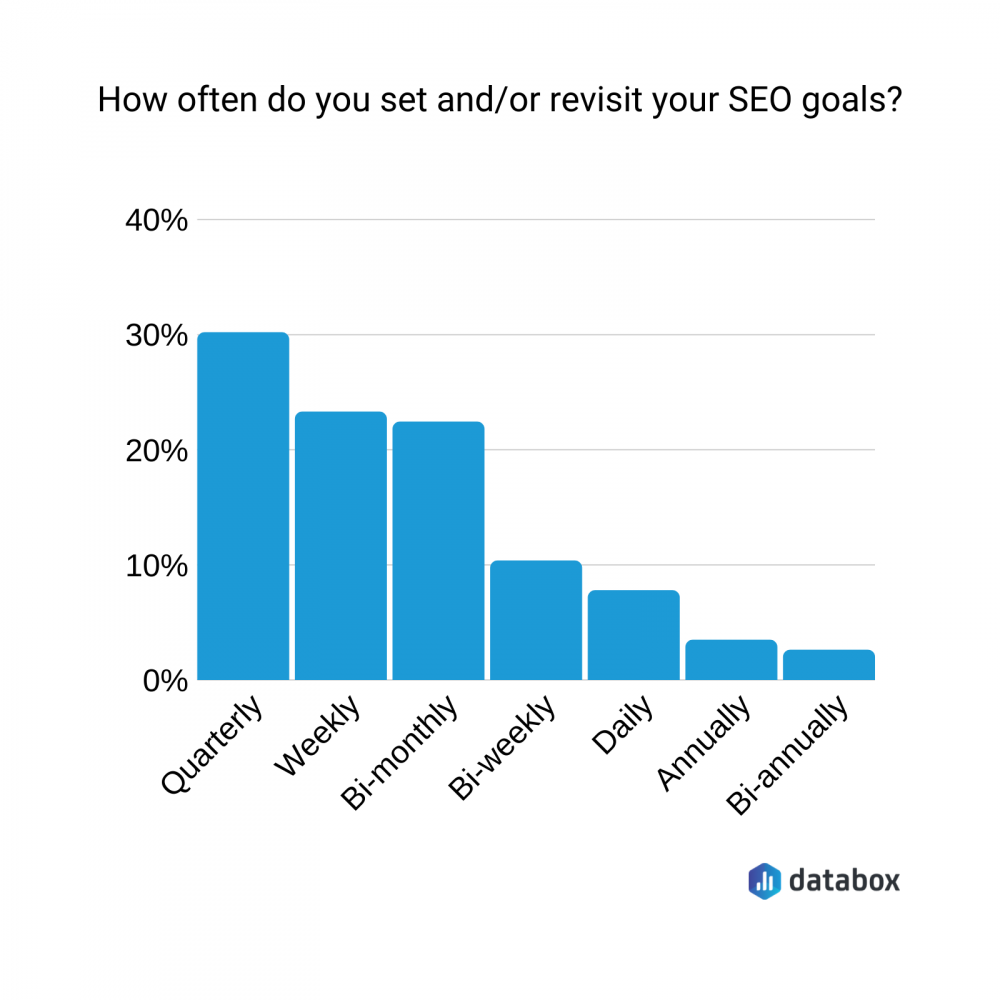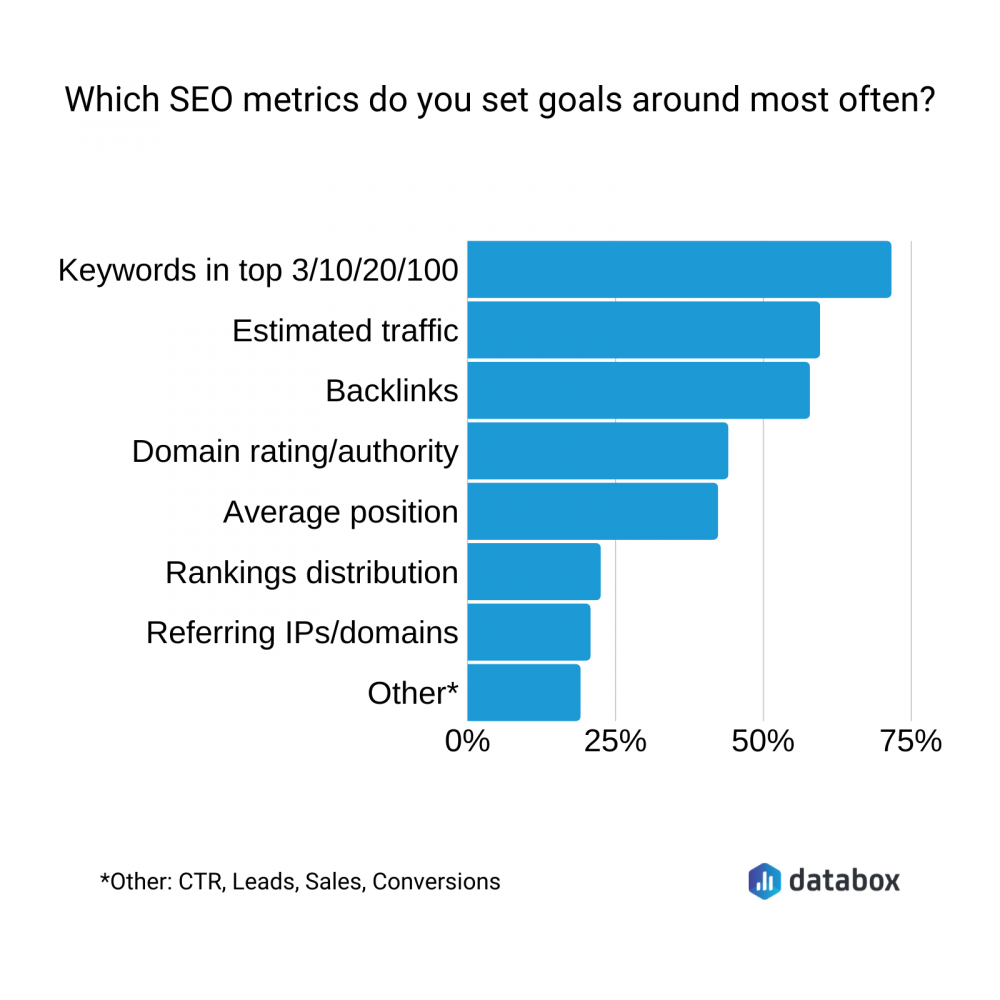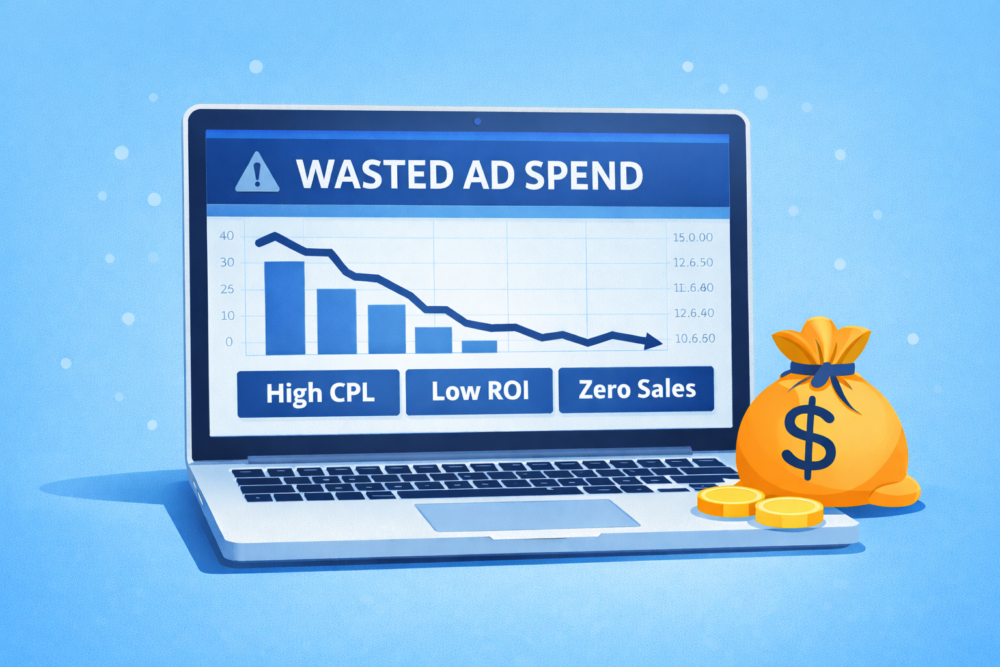Table of contents
SEO spending is predicted to hit $80 billion this year.
Your team might be contributing to that in some form.
You’ve got an SEO strategy, you’re paying for tools, you’re employing specialists, hiring freelancers or an agency, etc.. With such big spending and time investment, how do you know you’re seeing a meaningful return?
We asked 50+ experts to share how they set SEO goals they actually meet––those that really move the needle for their business. Their tips include:
- Be realistic
- Set goals based on historical data
- But don’t be afraid to aim high
- Review your SEO goals quarterly
- Create goals with measurable KPIs
- Avoid using vanity metrics
- Make your goals specific
- Tie SEO goals with business goals
- …And marketing goals, too
- Get inspiration from competitor analysis
- Prioritize high intent keywords
- Focus on quality over quantity
- Base goals on EAT guidelines
- Make a record of your starting point
- Think about how your customers use search engines
- Consider how your SEO goals impact conversions
- Set mini progress goals
- Separate goals by SEO activity
- Don’t be afraid to pivot
- Be patient
*Editor’s note: Do you know whether you’re on-track to meet your SEO goals? We’ve got a bunch of SEO dashboards that pull data from your favorite tools, including Moz, SEMrush, and Ahrefs. It’ll show your progress all in one place, using your most important metrics:

How to Set SEO Goals That Drive Action
1. Be realistic
When setting SEO goals, Peter Thaleikis of Bring Your Own Ideas advises to “be realistic: SEO isn’t an instant process such as software engineering. You need to make sure to set your expectations accordingly – especially when you are just at the beginning.”
“Getting the first backlinks and the first keywords to rank is the hardest part. Expecting to jump to the prime position within a short time is not realistic and sets you up for disappointment.”
Thaleikis continues: “If you are working with a team, make sure to communicate fair expectations from day one.”
Pelicoin‘s Anna Tatelman agrees: “Although you might want to be the highest-ranked website for a popular keyword, consider your Internet Authority first. You might, for instance, be able to out-compete results from smaller businesses, but it’s less likely that your domain authority is high enough to allow you to rank higher than Amazon or the Wall Street Journal.”
LaptopUnboxed‘s Adam Lumb explains: “For example, if you’re starting out a new site in a competitive industry, it’s incredibly unlikely that you’ll be ranking for the top keywords in a matter of weeks.”
“Instead, set yourself lower targets such as long-tail keywords where the competition is lower. These are much more reasonable targets which you can slowly build up from.”
Summarizing, Jessica Rhodes of Create IT Web Designs says: “Remember that SEO is a marathon and not a sprint. Progress is made over time and not quickly. SEO takes a lot of patience.”
Related: How 16 Marketers Set and Hit SMART Goals
2. Set goals based on historical data
We know that SEO goals need to be realistic. However, Ben Johnston of Sagefrog Marketing Group says: “Don’t look at a site and set arbitrary goals based on what you think sounds good, e.g. “we want to double our traffic”, or “we want 200% more users!” these are goals that are destined to fail.”
“If you want to develop realistic goals, look at your past data from your SEO dashboard and analytics and set predictive goals based on existing data and seasonality, e.g. “we had 70% more users during that time period, lets set tactics to increase traffic for that same time period using these tactics.”

That’s why SH1FT‘s Aristide Basque recommends to “look at what you’ve been able to achieve in the past and where others in your industry are. Setting realistic goals can help you grow much faster.”
Filip Silobod of Honest Marketing Galway adds: “I look at competitors, their backlink profile, content, and other SEO factors and see how much I could be ranking better. What would be my realistic ranking position if I improve? If you want to rank better you need to do SEO better than your competitor and that takes time.”
Editor’s note: Setting up SEO goals for the first time in an SEO reporting tool? Databox allows connecting the data sources that contain information about your SEO performance, such as your website analytics platforms, such as Google Analytics or Adobe Analytics, or your search engine rank tracking tool. Select metrics like the number of visitors, a target ranking for your keywords, or a target conversion rate. This will serve as a benchmark for your SEO performance and help you reach goals in a realistic timeline.
3. …But don’t be too afraid to aim high
Jeremy Cross’s team at Virtual Team Building has the opposite approach to setting realistic goals: “A lot of marketers choose SEO goals that are very attainable, for example by going after long-tail keywords or otherwise low volume. This conservative approach is helpful for producing cumulative results in the long term, but you should also take some swings at big hits.”
“For example, go after two or three high volume and highly competitive keywords in your niche. Even if you don’t rank now, you will be in a better position a year or two from now when your site is more authoritative.”

Pickfu‘s William Chin explains how to manage that for organic traffic goals: “Many business owners still think that SEO is some sort of black magic and that they can grow their business +400% over one year of SEO services.”
“Now, while some industries and businesses may see this growth (a minuscule amount), most will see only 20 – 30% growth year over year as long as the search trends permit that growth. Therefore, it’s always better to create a “low, medium, and high” threshold of organic traffic growth for your clients – giving them a range for their propensity to grow organically.”
“I usually set my floor fairly low, and my ceiling a little lower then what my high estimate will be,” Chin says.
4. Review your SEO goals quarterly
“One tip that I have is to set your goals quarterly but always be ready to revise them,” says Malte Scholz of Airfocus.
“Things change and especially with Google and its algorithms. Be flexible with your goals because one slight algorithm change could make a major difference in your overall SEO performance. Be ready to adapt at all times.”
Maybe that’s why most marketers set and revisit their SEO goals quarterly:

Ron Stefanksi of YourHouseNeedsThis.com adds: “I think my biggest tip for setting goals in SEO is that people need to understand you need a long time-frame in order to correctly measure results.”
“If someone is making their SEO goals in a very short time frame, I think that they’re setting themselves up for failure because generally, SEO tweaks and changes can take quite some time to make an impact.”
In fact, CosmoDoggo‘s Alfredo Bernal explains how this can tie-in with making your SEO goals realistic: “One tip we live by when it comes to setting goals for SEO is having a realistic timeline to achieve specific objectives. For some goals, the results will be instant while others will take months to achieve, so having realistic goals is very important.”
5. Create goals with measurable KPIs
“One tip for setting goals for SEO is to identify goals with measurable metrics,” writes Alex Williams of Hosting Data.
“Your SEO strategy should complement your business goals and marketing strategy, which can often be hard to quantify, so by setting SEO goals with measurable metrics you can pinpoint what is working and what isn’t.”
Williams explains: “A good example would be organic search visits, measuring the raw traffic that is sent from organic search as a key indicator of how well your SEO strategy is working.”
It’s also why Stridec‘s Alva Chew advises to “make sure that whichever goal that you set for SEO, it can be measured and traceable by to specific actions and efforts that you made. Otherwise, you have no idea if you are progressing on pure luck or as a result of certain actions you did.”
Thomas Howard of Meal Prepify also recommends to “focus on the metrics and processes that you can control. I have loosely set goals for things like traffic, domain authority, and what keywords I want to rank for, but I really focus on the specific actions I can take to improve my SEO and organic traffic.”
“Instead, it’s much better to focus on the number of keywords that your site is appearing for in organic search results because this is a metric you can control. The more content you produce and the more links you acquire, the more keywords your site will appear for.”
“And although it’s likely that not all of the keywords your site appears for will drive traffic, many of the longtail searches will,” Williamson says.
Colin Mosier explains how they do this at JSL Marketing & Web Design: “One common measuring tool is Google Analytics. By using Google Analytics, we are able to monitor new traffic and also measure the percentage increase in traffic.”
However, Jeremy Harrison of Hustle Life has a word of warning: “Looking at a single metric in isolation will only tell part of the story. It would be best if you mix and match parameters until you find the correct combination to understand the story behind everything. It would then be easy for you to achieve your goals once you get the big picture.”
Related: 50+ Experts Share the SEO Metrics They Track Every Week (& Why You Should, Too)
6. Avoid using vanity metrics
You’ve got a list of metrics you’re tracking for each SEO goal.
However, Jamie-Lee Kay of The Other Straw adds that you should “avoid vanity metrics when setting goals for SEO. Set specific, relevant, and trackable SEO metrics that lead to your long-term marketing strategies and goals. As an example, growth in referring domains to a specific page or organic CTR %.”
BrandExtract‘s Chris Wilks agrees: “If your main goal is #1 rankings then how does that benefit your business? Not nearly as much as driving qualified traffic to important or high-converting pages on your site.”
Jess McClory of Logic Digital adds: “Set goals for more than one SEO metric as this will help you focus your work on genuinely improving performance – not just achieving a single number for vanity’s sake.”
PRO TIP: How to Monitor and Evaluate Your SEO Performance
If you want to understand how your visitors are behaving on your landing pages, there are several on-page events and metrics you can track from Google Analytics 4 and Google Search Console that will help:
- Organic clicks by queries. Which search queries generate the most clicks to your website?
- Organic clicks by page. Which pages receive the most clicks from search results pages?
- Organic sessions. How many organic search sessions does your website receive?
- Organic engaged sessions. How many website visitors were engaged with your content? An engaged session lasts longer than 10 seconds, has a conversion event, or has at least 2 pageviews or screenviews.
- Views per channel. Which channels generate the most views to your website?
And more…
Now you can benefit from the experience of our SEO and website conversion experts, who have put together a plug-and-play Databox template showing the most important metrics for monitoring your landing page performance. It’s simple to implement and start using as a standalone dashboard or in marketing reports!
You can easily set it up in just a few clicks – no coding required.
To set up the dashboard, follow these 3 simple steps:
Step 1: Get the template
Step 2: Connect your Google Analytics 4 and Google Search Console accounts with Databox.
Step 3: Watch your dashboard populate in seconds.
7. Make your goals specific
“There are many factors that can negatively affect rankings but it is essential that when setting a goal – such as ranking position – that you define what success actually looks like so you know when you have achieved your goal,” says Ditto Digital‘s Michelle Symonds.
“Setting a goal, for instance, as “improving rankings” is simply not specific enough. Instead, the best tip for setting goals is to be very specific about the objective e.g. “achieve a Top 3 ranking for keywords A, B, C in Google for both mobile and desktop searches”.”
Shophysio‘s Eloah Manzoli adds that if your SEO goals aren’t specific, “you’re probably going to struggle to achieve the end result or find yourself going off track.
“Setting an SEO goal like increase my organic traffic by 100% might sound nice but it needs to be broken down to cover the specifics. So increasing organic non-branded search traffic by X% month-over-month by October 2020 would likely be a closer fit.”
That’s why Donna Duncan of B-SeenOnTop recommends to “agree on clear and unambiguous metrics and criteria for measurement. This helps prevent misunderstandings and failed expectations due to different interpretations of the same goal.”
“For example, do not say “increase traffic and conversions by x percent.” Instead say something along the lines of “increase organic traffic from human visitors in New Jersey, Delaware, and Pennsylvania by 10 percent over this same time period last year as measured using Google Analytics. Achieve this goal by dd/mm/yyyy assuming a start date of dd/mm/yyyy,” Duncan adds.
8. Tie SEO goals with overall business goals
“The one tip for setting SEO goals I can recommend is to evaluate where you want to direct your business and how you can scale it,” says Mattress Battle‘s Mason Cullingan.
“I give weight to quality, so my website’s authority is currently an important goal. Hence, I focus on link building and attracting traffic.”
Laura Mahaney of Bluberry Creative agrees: “If your company needs to grow a certain division, set SEO goals that help grow that division. Don’t just go for the most searched keywords, go for the keywords that will support your company.”
Sadia Ahmed puts that into practice for Frontier Blades: “For instance, as an e-commerce business, our primary business strategy includes increasing organic search traffic and revenue generation. Therefore, our SEO goals involve creating new detailed, and keyword-optimized product pages integrating long-tailed keywords characterized by increased conversion rates.”
“At MARION, our SEO goals are tied strongly to the business outcomes we wish to achieve. After setting a meaningful SEO goal, we reverse engineer the objectives that will get us there – regardless of keyword difficulty scores and strength of first page incumbents,” Tony Mastri adds.
“For example, one brand I’ve worked with was based out of a small 70k person city and taking on Silicon Valley and Mountain View companies with global brand recognition.”
Mastri continues: “Despite the competitive atmosphere, we developed an SEO strategy for this unheard-of brand that got them to (and kept them in) position one for one of the highest competition keywords in their industry. Their goal was lofty, but we didn’t let the competition prevent us from setting it.”
AcerSEO‘s Richard Garvey adds: “SERP rankings for keywords nobody is searching for may be good for an agency trying to convince you that SEO is working, but the true measure of SEO is an increase in lead generation KPIs that lead to increased revenue.”
“That can vary from business to business but it typically is: leads for B2B, traffic for blogs, and sales for e-commerce.”

Summarizing, Allison Chaney of Boot Camp Digital says: “When setting goals for SEO, think about the impact and focus on goals that align with the biggest possible results that you can drive for your business.”
Bonus tip for working with SEO clients
If you’re doing this for your SEO clients, Brendan Tully of The Search Engine Shop has a smart hack: “Step 1 in our process is to have them perform a brainstorming exercise and write down all the products and services they want to promote and then rank them in order of priority.”
“Taking this simple first stuff gets everyone clear on what the priority is, what our actual target is and then naturally leads to the second step in our process which is making sure each one of those products and services has a page on the website. A fundamental rule of SEO is that you can’t rank for something if you don’t have a page for it.”
9. Tie SEO goals to overall marketing goals
It’s not just your overall business goals that your SEO targets need to tie-in with, as Steve Yanor of Sky Alphabet Social Media explains: “Your SEO goals are tied to your marketing goals.”
“If your marketing goal is to get as many people as possible to register for new real estate development, your SEO goals will involve things you can do to try to and attract as many people as possible Googling for deals on new condos during the downturn.”
“As a result, you would want to implement and report on activities that involve enhancing the visibility of key pages and increasing clicks to (and through) these pages,” Yanor explains.
Related: 13 Tips for Setting (and Achieving) Your Marketing Goals
10. Base goals off your SEO competitor analysis
“One tip for setting SEO goals would be to analyze your competition,” says Anjana Wickramaratne of Active Digi Solutions.
“SEO goals may change from business to business, some may find it easy to rank as there is less competition and some may find it much harder to rank as a result of much higher and tougher competition. Therefore analyze your competition first and then set up your SEO goals according to that data collected.”
Ashley Sterling of The Loop Marketing explains how this data is crucial for SEO goals: “If you see data that isn’t matching what your goals are, data gives you the opportunity to change it immediately.”
Thumbprint‘s Morgan Lathaen adds: “Some phrases are easier to rank for as there is less competition. Companies who want to rank on page one for ‘trophy’ keywords or highly competitive phrases may have to tone down their expectations. Find a workable blend of short-tail and long-tail keywords to drive pre-qualified traffic to your website.”
It’s why Anna Bratishko says: “Always analyze the niche you want to succeed in. The comprehensive analysis will help to set SEO goals correctly.”
“You’ll be able to prioritize the steps of website promotion and allocate the budget into each of the steps, respectively. Here at copywritely.com we build our SEO strategy according to the main goals we want to gain. The process is quite simple: analyze, prioritize and implement.”
*Editor’s note: Struggling to keep tabs on your competitor’s SEO strategy? Add their URLs to AccuRanker, then use this dashboard to see how their metrics change over time. If you spot a sudden change, investigate it:

11. Prioritize rankings for keywords with high intent
“You can not do ANYTHING at all until you do your keyword research,” says Jennifer Gardella of The Gardella Group.”
Your entire SEO content strategy rests on having the right keywords dropped into your website and social media posts. A well thought out and heavily researched keyword strategy is your first step and can not be skipped.”
However, Sean Spicer thinks you should “focus on search intent before keywords. Getting 10 visitors who are ready to buy based on a low traffic search term is much better than 20,000 who just need information.”
Spicer explains, “[Agile IT] rank in the top five for dozens of Microsoft Licensing terms getting over 50,000 hits monthly. Yet a top-ranking blog on setting up compliance in teams with only 1500 hits per month brings in 25-50 qualified leads per month.”
“Because we focused on what someone would be searching for when needing our services, instead of what keywords we COULD rank for, we wound up with one of our most successful organic wins.”
12. Focus on quality over quantity
It’s tempting to set your SEO goals on something big. You want more links, more traffic, and more sales, right?
But according to LetMeBank‘s Morgan Taylor, you should “stop working on getting more links, and concentrate on getting better quality links. So when you set your target for how many links you are going to make per quarter, reduce the quantity and increase the quality.”
Katie Eldred of Promotique by Vistaprint explains how you can do this: “For backlinks, make sure you also set a goal relating to the authority of referring domains, rather than just the number of new backlinks you’d like to gain. This way, you can focus on earning high authority links which are more valuable.”
Matt Glodz explains what this looks like for CV Pilots: “When looking at Google Search Console metrics, it’s easy to get lost in the sheer amount of keyword-specific data. To focus your efforts, identify your top 20-30 target keywords based on their search volume.”
“Then, create a spreadsheet to monitor how your position ranking, impressions, and clicks for those keywords are trending each month.”

GrowthHackers‘ Jonathan Aufray adds that this concept applies to traffic, too: “A lot of marketers believe that more organic traffic means better SEO. This is not always the case. You don’t want more organic traffic, you want better organic traffic. You want to make sure that your website visitors are qualified and targeted.”
“If you sell jewelry to teens living in Los Angeles, you don’t want to get organic traffic from doctors living in Asia. Make sure you target the right keywords and offer the right content to your audience.”
“Don’t focus on your organic traffic, focus on the number of leads and sales your organic traffic brings you,” Aufray says.
PRO TIP: Connect your lead generation tools such as HubSpot, Salesforce, and Google Analytics with marketing reporting software like Databox to track sales leads from your organic traffic. By monitoring your lead generation metrics and analyzing your data, you can make informed decisions and drive more leads to your business.
13. Base your goals on EAT guidelines
“Google prioritizes expertise, authority, and relevance [EAT]—meaning that each of your goals needs to accentuate EAT standards,” says Madison Smith of Bestcompany.com.
“Below demonstrates how every SEO goal can be more EAT focused by asking a series of questions. Does this goal…
- Help you produce deep and comprehensive resources for industry-specific topics? [Expertise]
- Aim to establish you as a credible leader and example in your industry? [Authority]
- Keep content up to date and current to fit the present landscape? [Relevance]”
14. Make a record of your starting point
Before starting work on any of your SEO goals, Leslie Kinson of Internet Reputation recommends to “record metrics for your current status before starting your implementation strategy.”
“Then, make sure you have adequate tracking in place using an SEO dashboard software and scheduled data capture in order to be able to measure the success of your goals as you start implementing your strategy.”
Catherine Way of Hard Money Loans Scottsdale adds: “When setting goals for SEO, you need to [already] have a clear understanding of what metrics drive your site, whether it is a particular keyword, location, or time on page.”
15. Think about how your target customer uses search engines
So far, all of our goals talk about our website. We want Google to think we’re the best thing since sliced bread. But what about our customers?
Silvia Martinez of Mama Latina Tips Media thinks you should “focus on your avatar, who is your audience? What information do you offer that they like? Knowing your analytics will help to answer this question.”
16. Consider how goals impact conversions
“I think the most important goal is to look at conversions,” says Tom Brodbec of Found Search Marketing.
“People get worked up on different vanity metrics in rankings and traffic, but if they aren’t delivering any results, what does it matter? A good SEO strategy focuses on a number of different SEO tactics that deliver the ultimate result: conversions.”

Related: How to Build an SEO Report: 27 Metrics & Insights To Include
17. Set mini progress goals
You’ve got one major SEO goal that you’re planning to achieve. According to Stratabeat‘s Tom Shapiro, “it’s important to set specific process goals for your SEO program, as these act as lead indicators for the achievement of your ultimate, end goals.”
“As you have full control of the actions needed for process goals, this is where you should focus your energy, resources, and funds.”
Shapiro explains: “For example, how many blog posts will you produce monthly, and at what frequency throughout the month? Many organizations focus exclusively on lag goals. That’s a problem–you have no control over lag goals other than the inputs, or process goals, that help you achieve them. Process goals are a critical ingredient in an SEO program that’s going to produce significant results.”
Bram Vergouwen of Vergouwen Media explains the difference between progress and standard SEO goals: “Far too often, clients I work with want to focus on the number of visitors their site receives (excluding blogs/publications here), or, even worse, the number of backlinks for example.”
“These things are more milestones than they are goals. These can be used to support the reporting on your main goal(s), but there’s a clear difference from your end goal. They’re a means to an end. This end is your real goal.”
“No client/customer is going to buy from you because they analyzed your backlink profile and like what they see (unless you’re selling to SEOs that is! In that case, they might…),” Vergouwen continues.
“Things like speed, backlinks, visitor numbers (excluding blogs/publications), etc may be milestones in some instances, some might be supporting goals, but they’re not the end-goal!”
18. Separate goals by type of SEO activity
An entire SEO strategy consists of different activities. We can group those activities by the following:
- On–page (meta tags, content, image optimization)
- Off-page (backlinks and driving traffic)
- Technical (crawl errors, sitemaps)
- Local SEO (Google My Business listings)
“While “SEO” is a well-known industry term, there are so many different variables and parts that comprise a strong strategy,” says Dylan Zsigray. “Just like Google has 200+ ranking factors it uses within its algorithm, companies can have a multitude of focus points within their organic search plans.
“So, when creating goals to monitor the progress of these strategies, Kiwi Creative recommends dividing these into front-end and back-end goals.”
Zsigray continues: “With SEO, there is a user-facing, content angle and a robot-facing, technical angle. These are two separate parts and should be treated as such. Create goals that focus on just one part. For example, do not create a blog average SERP position goal that is based on the page loading time! Instead, base it on the relevance of the content itself based on what your users are searching for.”
Matt Edstrom of GoodLife Home Loans adds: “It’s best practice to focus on technical, on-page, and off-page SEO when possible as all of them affect your site’s performance in SEO.”
Related: 33 SEO Quick Wins: On-Page, Off-Page, Technical & Local
19. Don’t be afraid to pivot your SEO goals
According to Tung Dao of Avada Commerce, “you need to understand that your SEO goal is just your estimation, no more.”
“The SEO industry is changing every single day, and there are so many factors that you simply cannot control. So if something ever comes up, don’t afraid to adjust your goals and adapt to the situation.”
Nikola Roza explains: “Google changes its algorithm all the time. You need to factor in that in your calculations. So it’s ok to set SEO goals and to work hard to get them, but you also need to be aware that Google could switch something today which would make your perfect plan yesterday’s news, and suddenly stale.”
Then you need to adapt quickly and you need to keep going. Why? Because Google’s algorithm changes are incremental (even when on the surface they seem big) and that means they build on those that came before it.
“This means that your stale plan can become fresh again as soon as you realize that something changed and that you need to make corrections to follow the best practices for this “new” algorithm.”
Mailbird‘s Andrea Loubier explains what that looks like in action: “When you see that particular keywords aren’t ranking, then it’s time to implement a new strategy, or perhaps even go with different keywords. You can’t keep on with a process that isn’t working. You’ll only lose valuable time and potential opportunities.”
20. Be patient
“With SEO, it’s important to be patient and set goals in terms of quarterly progress. Investing in SEO with a good strategy can have a very high ROI, but it takes time to pay off,” says SoftwarePundit‘s Bruce Hogan.
“Unlike paid search or social media content, it can take 2-3 months for SEO improvements and new content to start performing well in Google’s search results. As a result, it’s best to look at longer-term trends rather than short-term fluctuations.”
Kevin Suite of Vineyard Johns Creek agrees: “The best tip to remember when setting SEO goals, is that SEO is a long-term game. While it’s true algorithms change frequently and you need to keep up with that, consistency is also very important.”
“You won’t see success in rankings if you are constantly tweaking fundamental items each month. Sometimes you have to set certain strategies and let them take time to go into effect. It’s also not wise to ‘set it and forget it’ – but a nice balanced, long-term strategy will help you achieve your goals.”
Ben Arndt of DUNK Basketball summarizes: “Don’t fret if immediate results aren’t realized. If SEO is undertaken in a trusted manner, you will eventually see acceptable gains. In our experience, it can often take 12-24 months for such work to come to fruition.”
*Editor’s note: As you go through the motions of an SEO strategy, keep tabs on whether you’re on-track to meet your goals with our Google Search Console Basics dashboard. It pulls data from your account on a monthly basis, hopefully showing an upward trend:

Set SEO goals you’ll actually stick to
Ready to set SEO goals your team is motivated to meet? With these tips, you’ll plan targets that are realistic and achievable, whilst also pushing yourself. That’s the best combination for any SEO goal.















